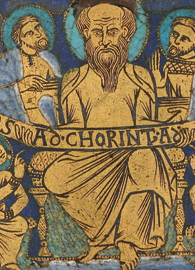Romans Week 8
Advice to the Church: Romans 12
Seattle Pacific University Professor of Dogmatic and Constructive Theology
Read this week’s Scripture: Romans 12
13:01

 EnlargeA Living Sacrifice
EnlargeA Living Sacrifice
After the interlude of Romans 9–11, Paul picks up where he left off in Chapter 8, speaking of the various implications of this new way of life in Christ Jesus and his Spirit. As we have mentioned time and time again in this series, there is an active involvement on the part of believers. Paul opens in Chapter 12 exhorting us to present our bodies as a living sacrifice, “holy and acceptable to God, which is [our] spiritual worship” (12:1).
The notion of a “living sacrifice” is vintage Paul: on the surface we have an apparent contradiction, but it actually serves to promote a deep truth. In typical sacrificial practices, offerings were brought to God that were either inanimate or about to be slaughtered: either grains and other non-living objects, or animals — which had to be killed in order to be sacrificed. In both cases, the sacrifices were offerings that could be gathered and presented.
Sacrifices were important for the life of Israel, but at times we notice God’s displeasure with them, most apparently when the sacrifices were externalized and used as a way to avoid internal change or conformity to God’s will. Obedience and not sacrifice is what God ultimately values. That is not to say that sacrifices are not important, but they are important only insofar as they indicate a reality in conformity to God’s will on behalf of the one sacrificing.
And so the greatest sacrifice we can offer to God is ourselves. But unlike traditional sacrifices, we continue to live and move about, so there is a constant possibility of abandoning our purpose and call. As “living sacrifices,” as those who have been baptized into Christ’s death, we are called to enact cruciform lives — that is, active lives that willingly submit to God in an ongoing, sustained fashion. Ultimately, this is what God wanted from His people all along. Some got it; most didn’t.
Worship: The Point of It All
In becoming living sacrifices, we fulfill our whole reason for existing: to worship God. If it sounds ridiculous to say that our whole point in living is to worship God, it is because we have a faulty understanding of worship. Worship is not simply what happens 20 or so minutes prior to the sermon on Sunday. Worship is not just singing praise songs. Rather, worship is a way of being, a way of life that marks all aspects of our existence because it offers our lives in an ongoing way to a God who is apprehended by faith.
And if our entire lives take place before God, then everything can be offered as a living sacrifice: how we talk, eat, order our lives, relate to God and others, spend our time — basically everything we think, feel, and do. In order to engage in such a life faithfully, we are all in need of “stepping away” and “moving toward.”
As for the first part, as Christians we are called to step away from the world. To a certain degree, we can prevent ourselves from being conformed to this world. So much of what we do in life is on the basis of the kinds of decisions we make. Well, what if we started making decisions as if God were right in front of us? Would that change anything? Would we make different choices after all? I suspect all of us would, and those changes are not ones that God will simply take care of for us.
No, those are matters we have to attend to; we need to step away. But in stepping away, we are not simply resorting to living in a “placeless place.” There is no such thing. If we are actively seeking to dislocate ourselves from one place, it is because we are at the same time actively locating ourselves elsewhere.

 EnlargeThe Renewing of Our Minds
EnlargeThe Renewing of Our Minds
And this “elsewhere” can be the presence of God, the God whose Spirit can transform us by the renewing of our minds.
It’s interesting that Paul links transformation with the renewing of our minds. It is almost as if, in being made into new creatures (transformed), we can apprehend reality differently through a renewed mind. By thinking differently, we will see differently.
This altered vision is crucial, so that we can discern the will of God. Without a basic, fundamental change, we will continue to think lies to be truth and truth lies; we will distrust God and God’s will for our lives because we will incorrectly see God as a threat rather than a source of life. The joint movement of “stepping away” and “moving toward” signifies that, rather than remaining enemies, we can grow evermore to be friends of God.
If we are friends of God who are growing in conformity to God, inevitably we as children of God will grow closer to one another. In this sense, we are a single body, bound by our love of and for God; we are the body of Christ. Paul proceeds to extend the metaphor of the body by stating that just as a human body has many members, so does a church body have many members, each with different gifts. The diversity of gifts suggests at least the following:
- First, there are ample resources within the church, in that the Spirit has chosen to provide a multiplicity of gifts for the church in its ongoing task of “stepping away” and “moving toward.”
- Second, the multiplicity of gifts means that all members need one another, that each member has a role to play in the mutual edification of the church. For this reason, there is no recourse to pride or boasting in the church, in that one’s gifts are strictly complementary to others’ gifts. We may recognize such arrangements better in relationships like marriage (where it is often said that “opposites attract”), but the principle holds in the church as well. Some within the church are called to function prophetically, others didactically, and the possibilities go on. Within the catalogue of roles found in 12:6–8, surely each believer could locate himself or herself within at least one role more than others — again, not for the sake of boasting but for service to one another.
Paraenesis
Paul continues from 12:9 to the end of the chapter to offer paraenesis. Paraenesis is simply exhortation, good advice, and helpful practices. These exhortations are to be regulatory not only within the church but also as the church reaches out. They are helpful observances even today, for they are timeless attitudes and activities that should mark God’s people.
Paul’s paraenesis is helpful for a number of reasons here:
- First, and most obviously, Paul does not want his heady, sophisticated, and abstract reflections to take away from day-to-day living. If Christianity is not simply a philosophy or worldview, then it has to influence how we live, how we treat one another, and how we engage the wider world.
- Second, Paul is trying to show that all would be for naught if this way of life were not on display. One of the constant charges Christians have to face is hypocrisy, because of the lofty standards Christians promote as their ideal for their lives. Christians often fall short, but such unfortunate developments should not take away from the ongoing task of showing the world an alternative.
- Finally, it is impressive how much of what Paul says here is reminiscent of both Christ’s life and his teachings. In fact, without any significant qualms, we could ascribe to the life of Jesus all features of Paul’s paraenesis, and much of what Paul says here is echoed in the gospels. Living a transformed life, one that is shaped and empowered by the Spirit, has to bear fruits of the new order that is God’s kingdom. What we will experience in the afterlife should mark our common life now. Such fruit would include avoiding evil, doing good, and living a life of unbounded, other-directed love.
Paul emphasizes repeatedly in this paraenetic discourse the Christian responsibility before evil and one’s enemies: “Do not repay anyone evil for evil, but take thought for what is noble in the sight of all” (12:17). Paul continues by advising to live peaceably with others (12:18) and not to avenge oneself but to leave vengeance to God (12:19). Rather, Christians are to care for their enemies — in short, overcome evil not with evil but with good (12:21).
Again, these remarks would suit Jesus well, but they are also timely for the life of the Roman church in the mid-50s. As noted, Jews had a history of being persecuted in Rome, and, as their numbers grew, Gentile Christians would also be perceived as threats to the state because of their refusal to engage in what they considered idolatrous activities with respect to the state and the emperor. Vengeance was a real option for these Christians, and, looking back at the matter, one can see the rationale for the temptation.
Evil Begets Evil
But Paul knew a truth that many have since recognized: When evil is offered as a response to evil, a cyclical, potentially never-ending pattern begins. We see such instances with ethnic conflicts throughout the world: the sundry parties and factions often cannot claim the moral high ground, because they are all guilty of perpetrating horrendous evils in the face of “seeking justice” or “righting a wrong.” With such a posture, the stakes rise and conflicts often escalate with opposing sides trying to outdo one another. Paying evil for evil never works as a strategy for peace.
And it can never work for showing the world what the gospel really entails. One of the best ways of sharing the gospel is not through eloquence of speech or command of biblical verses or ideas but through the integral life lived coherently, truthfully, and beautifully.
I often tell my students that our lives on display for the world to see is a statement about the gospel. It may be a good statement, and it may be a bad one, not because the gospel is bad but because we fail to live into it in such a way that its power comes through. In one sense this is a lot of pressure for us as Christians, but in another sense we ought to be living into the fullness of the gospel day by day, whether or not the stakes seem high.
At a very basic level, when one becomes a living sacrifice, when one’s mind is constantly being renewed, when one is discerning and living into the will of God, options open up and others close. Gradually, vices, sins, and other lamentable behaviors and motivations start to become less compelling, less enthralling, less a part of who we are. We can know that something remarkable has happened when others stand in awe of our lives, and our response is simply, “We’re Christians; this is what we do.”
In the words of Dietrich Bonhoeffer, what seems extraordinary to the world has to be ordinary to us [Author’s Note 1]. The gospel is extraordinary to a world that is dying without it; but for us as Christians, the gospel is what we’re about.
Questions for Further Reflection
- Why do you think the first few verses of Romans 12 are so often quoted? That is, why are these words so important to the life of faith? What does it mean for us to offer ourselves as living sacrifices or to have a renewed mind?
- What do you make of the Lectio writer’s claim that “our whole point of living is to worship God?” Spend some time reflecting on ways in which your life may or may not embody this claim. What are some steps you can take that might position your life in a more authentic posture of worship?
- The Lectio writer tells us that Paul’s exhortation in 12:9 onward is called a paraenesis. What are some aspects of this paraenesis that most challenge you or challenge the community life of your church?
<<Previos Lectio Back to Romans Next Lectio>>

This work is licensed under a Creative Commons License.




